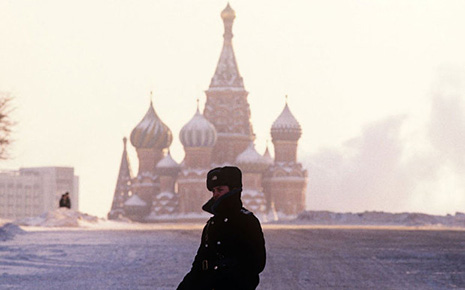Economic Fears May Push Russia Into Ukraine Deal

The turmoil in the Russian economy appears to be encouraging Moscow to seek compromise in the crisis over Ukraine, although President Vladimir V. Putin has proved so erratic in past months that Western leaders are wary of proclaiming progress, officials and analysts said Wednesday.
On Sunday and again on Tuesday night — after days in which the ruble gyrated wildly, raising the possibility of a broader financial crisis that could saddle Mr. Putin with deeper economic and political problems — the Russian president spoke by phone with his Ukrainian, German and French counterparts. Statements released afterward in all four capitals talked of moving quickly to cement a cease-fire broadly observed since last week in eastern Ukraine.
Mr. Putin may make his intentions clearer at his annual news conference on Thursday. European leaders will meet later Thursday and Friday in Brussels amid growing indications that pro-Russian separatists and Ukrainians could meet Sunday or Monday for talks under European auspices.
One wild card is the threat by the United States to move ahead with a new round of sanctions against Russia.
The White House said Tuesday that President Obama, despite misgivings about falling out of step with European allies and complicating the talks, would sign newly passed legislation expanding the financial sanctions and providing additional military aid to Ukraine.
While leaving the United States at risk of becoming out of step with Europe, which is not seeking tighter sanctions, the new legislation could also help pressure Mr. Putin to seal a deal on Ukraine now that would relieve some of the pressure on the Russian economy.
On Tuesday, Secretary of State John Kerry said that sanctions “could be lifted in a matter of weeks or days” depending on how Mr. Putin acts.
In Moscow, some analysts said the Kremlin appeared to have started moving toward a more flexible position on Ukraine before the ruble’s nose dive, but the currency crisis of the past few days made progress imperative.
“It seems like the new economic situation will inevitably force Russia to focus on the domestic crisis,” said Fyodor Lukyanov, the editor of the journal Russia in Global Affairs.
At the same time, Mr. Lukyanov said, Mr. Putin is unlikely to abandon the separatists in eastern Ukraine.
Obama Signals Support for New U.S. Sanctions to Pressure Russian Economy DEC. 16, 2014
Ukraine and Rebel Group Say They’ll Recommit to a Cease-FireDEC. 2, 2014
“Putin’s credibility might be seriously damaged by this economic crisis,” he said. “If in reaction he begins to clearly give up on Ukraine, that will be detrimental to his position, and he cannot afford it.”
For some days, Russia experts in financial markets have suggested that Mr. Putin might agree to measures that would essentially freeze the conflict in eastern Ukraine, allowing aid into the region and halting hostilities, at least for the winter.
That arrangement would still allow Mr. Putin to claim he was preventing Ukraine from any further move toward the European Union or NATO membership, said Christopher Granville, a Russia expert and managing director of Trusted Sources, an emerging markets research firm in London.
Continue reading the main storyContinue reading the main storyContinue reading the main story
There is a gap between what Europe and Germany, its No. 1 economy, might want, and voices in Congress in Washington who “behold with satisfaction Putin going down in flames,” Mr. Granville said.
Europeans have to share a continent with Russia and fear turmoil in the East, he added, noting that severe upheaval in Russia could also “greatly increase the probability of a terminal meltdown in Ukraine” and could be counterproductive for Western supporters of the Ukrainian government in Kiev.
Ukraine’s currency has also plunged, and the country began an urgent appeal for more funds last week in Brussels.
Complicating the picture is whether pro-Russian separatists would attend cease-fire talks and whether Mr. Putin would deliver on any promises made there.
Federica Mogherini, the European Union’s new foreign affairs chief, reported “some limited hope” for a settlement to the conflict in eastern Ukraine based on a repeatedly violated truce agreement reached in September by pro-Russian separatists, Russia and Ukraine in the Belarus capital, Minsk.
“We have gone through this too many times to fall into illusions about turning points,” she said at a news conference on Monday. “I would not define any turning point at the moment, but still, there is a small reason for hope on which we can build.”
On a visit to Kiev on Tuesday, Ms. Mogherini pledged full European support for a new Ukrainian government and said the European Union would “stand firmly at your side to make sure the Minsk protocol is implemented firmly in all parts.”
Michael Thumann, a senior foreign correspondent and Russia expert for the German weekly Die Zeit, said he was skeptical about the prospects for a lasting agreement, given Mr. Putin’s need to appeal to different domestic constituencies at home and his behavior in the past year.
“Putin could try to solve economic problems with a new heroic, patriotic deed,” Mr. Thumann said. “I am not completely pessimistic, but at the moment, I just don’t believe in the durability of his actions.”
This kind of instability, he said, is anathema to German business. “German business is looking at this with great concern,” he said. “It all means nothing good for the Russian market in the near future.”
“A destabilization of Russia is in nobody’s interest,” said Eckhard Cordes, chairman of the Committee on Eastern European Economic Relations, a group traditionally pro-business with the Kremlin. “This would also have an impact on us.”
On Wednesday, spokesmen for the German government were careful not to link the turmoil in Russia to the sanctions over Ukraine.
“The crisis over the Russian currency and economics has various causes — not even primarily the sanctions,” said Steffen Seibert, a German government spokesman.














































